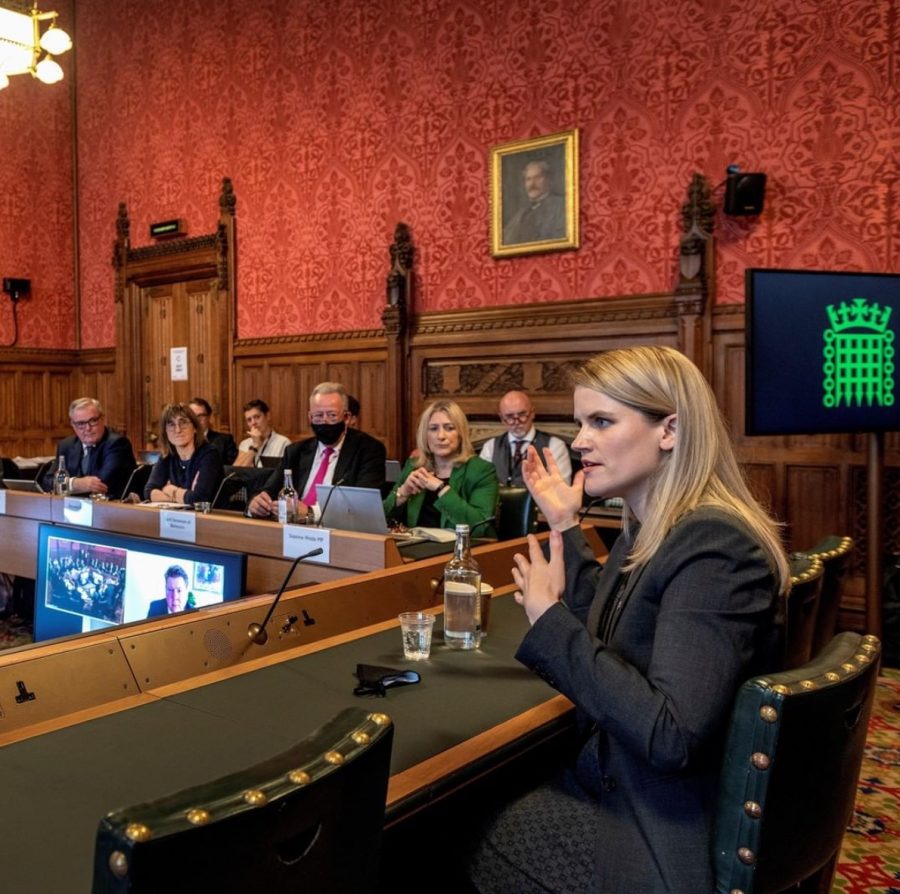Facebook Whistleblower testifies to Congress
October 26, 2021
A former product manager at Facebook, Frances Haugen, has turned whistleblower, disclosing covert documentation revealing obscured ramifications that the tech giant has purposely concealed and denied to the public sector.
Ms. Haugen testified to Congress on Oct. 5, convened by U.S. Senator Richard Blumenthal, Chair of the Subcommittee on Consumer Protection, Product Safety and Data Security in a hearing titled “Protecting Kids Online: Testimony from a Facebook Whistleblower.”
Ms. Haugen explained to lawmakers how Facebook’s Instagram app propagates harmful effects on young people, specifically teenage girls, how the platform handles children’s usage, and other digital consumer protection issues. Ms. Haugen’s also provided insight into how the company can update its child privacy regulations and other laws to benefit the consumer while using the app.
In the opening of her witness testimony, Ms. Haugen thanked Congress and subcommittee members for their “interest in confronting one of the most urgent threats to the American people, to our children and our country’s well-being, as well as to people and nations across the globe.”
Due to the immense profit provided by their digital consumers, company leaders are wary of making changes they know will make their platforms safer to use.
“Congressional action is needed. They cannot solve this crisis without your help,” Haugen’s pleaded.
The whistleblower has made it clear she has no intent to harm the corporation. Instead, Ms. Haugen is declaring that necessary sanctions need to be urgently implemented in order to benefit Facebook.
Before leaving the corporation, Ms. Haugen scanned documentation detailing Facebook’s internal affairs, such as research reports, digital employee communication, and drafted presentations from senior management. She shared her evidence of Facebook’s negligence with The Wall St. Journal, which has compiled an investigation of the documents called “The Facebook Files.”
The Wall Street Journal stated that “the documents offer perhaps the clearest picture thus far of how broadly Facebook’s problems are known inside the company,” all the way up to the Chief Executive Officer, Mark Zuckerberg.
Often brushing the cold shoulder, Mr. Zuckerberg is well aware of the issues swarming about the digital walls of his multibillion-dollar corporation, yet minimal actions have been taken to confront such conflicts.
In July, Vice anonymously interviewed a former moderator of Facebook, whose job “was to spend eight hours a day looking at all the worst things that people post online so that you don’t have to see it.”
“As an employee, you’re not entitled to find out what kind of harmful material you’ve been exposed to,” the interviewee said.
“Facebook denies that anybody could ever get PTSD. Nobody has been harmed. That’s very explicit.”
“There was a recording, somebody actually taped what Mark Zuckerberg was saying in an internal meeting with employees last year. And Mark Zuckerberg said, ‘That’s a little bit overdramatic.’ He just totally just dismissed all of the criticisms that have been made… These stories have been repeated enough times now that [Zuckerberg] needs to go down onto the shop floor and see how people work day in, day out, see what’s happening, and talk to people who’ve been harmed, and embrace the fact that he’s a got a problem he needs to solve.”
This is not the first time a whistleblower has publicized classified information to credible media outlets. Edward Snowden, the former computer intelligence consultant, leaked highly classified information to The Guardian in 2013 from the National Security Agency, the most significant intelligence leak in NSA history.
Whistleblowers advocate for public knowledge for the public sector, unmasking the realities of big tech corporations and how they are fully aware of the harm they cause.
Whistleblowers such as Haugen and Snowden provided concrete evidence of how the safety and security of shared digital content on the web have been vastly undermined and overlooked in the 21st-century.
As the world continually progresses toward a fully technologically centered society, many wonder where these developments will lead the Facebook franchise in the coming years. This story strikes a particularly sensitive chord with Millennials and Generation Z members alike as these age groups grew up in the shadow of Facebook and the social media revolution.
University senior Matt Cartwright said, “Honestly, I hope that this is the end of Facebook. I don’t think there is any more room for the type of toxicity and misinformation that the company has willingly contributed to over the last several years.” Cartwright is just one of many who have expressed a strong hope that the company will face an irreparable downturn in usage in the future.
For other members of the University community, Frances Haugen’s testimony symbolized a moment of justice for those deeply impacted by Facebook’s harmful policies that specifically target teenage girls. In her initial interview with 60 Minutes, Haugen revealed that one of Facebook’s internal studies found that “13.5% of teenage girls say that Instagram makes thoughts of suicide worse, while 17% of teenage girls say that Instagram makes eating disorders worse.”
This is not the first time such concerns about the platform have been raised. However, Haugen’s testimony does mark the first time that internal company data can corroborate these concerns.
University senior Veronica Reyes commented, “As someone who has struggled with body image throughout my life as so many girls have, it was both liberating and horrifying to hear the testimony.” Reyes has been a long-time supporter of body neutrality and believes that platforms such as Instagram and Facebook only make the fight against unrealistic body and image standards that much more challenging.
She later continued, “On one hand, I was so happy that people were finally seeing and believing the concerns and issues we have been voicing for so long, but on the other hand, it was really scary to hear just how deeply woven the damage and corruption actually is.”
In the aftermath of Frances Haugen’s testimony, it is unclear what Facebook’s next steps will be, but many remain hopeful that serious legal ramifications will follow. A site-wide blackout that occurred just one day after Haugen’s 60 Minutes interview has many speculating about the incoming effects of these developments.
Although it is unclear where the Facebook franchise will find itself in the years to come, there is one thing they can be sure of: social media is here to stay. If Mark Zuckerberg plans to keep his name on the right side of history, he will use Haugen’s courageous testimony and scandalous findings to grow the company in a positive direction that does not prey on the minds and emotions of people across the world.













